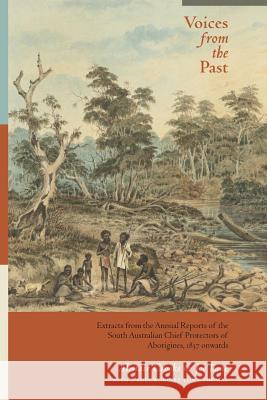Voices from the Past: Extracts from the Annual Reports of the South Australian Chief Protectors of Aborigines, 1837 onwards » książka
Voices from the Past: Extracts from the Annual Reports of the South Australian Chief Protectors of Aborigines, 1837 onwards
ISBN-13: 9780995404700 / Angielski / Miękka / 2016 / 332 str.
Voices from the Past: Extracts from the Annual Reports of the South Australian Chief Protectors of Aborigines, 1837 onwards
ISBN-13: 9780995404700 / Angielski / Miękka / 2016 / 332 str.
(netto: 75,84 VAT: 5%)
Najniższa cena z 30 dni: 79,41
ok. 16-18 dni roboczych
Dostawa w 2026 r.
Darmowa dostawa!
Even before the first colonists had left London the first Protector of Aborigines for South Australia had been appointed, charged with the duty as ‘ombudsman’ to act on behalf of the Aborigines in their dealings with Government and colonists. Twelve men in all were to occupy the position until 1940, when it was absorbed into the new Aborigines Protection Board.
In an era before Government ‘spin’ and political correctness, these men wrote unexpectedly frank and revealing reports which give an excellent and rather surprising picture of the times. One might expect Government reports to be tedious reading, but these are lively and full of human interest. This book publishes extracts from these reports which show how the Protectors struggled to find solutions to the same problems that baffle even the most modern of today’s policy-makers, solutions which were largely sympathetic to Aboriginal expectations and desires.
About the Authors
Alistair Crooks is a retired geologist who has worked widely in remote parts of Australia. This field work led to contact with many remote area Aborigines, and a deep interest in Aboriginal culture and Aboriginal issues. On retirement in 2014 he decided to explore the South Australian library archives to research various Aboriginal topics where he joined forces with Joe Lane, who had been doing a similar thing.
In 1966 Joe Lane married Maria Rigney, a Ngarrindjeri Aboriginal dedicated to early childhood education for Aborigines, after which they worked jointly for Aboriginal advancement for 43 years. In the 1980s Joe and Maria moved into roles involving academic support for Aboriginal tertiary students, with Maria winning a Masters in Education and a senior lectureship in Indigenous student support until her death in 2008. From his retirement at that time Joe has been researching, typing and making available on the internet, a rich vein of primary source material from government and institutional sources.
The book is dedicated to the memory of Maria Lane, née Rigney.











